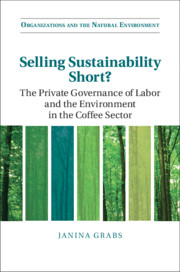 Selling Sustainability Short?
Selling Sustainability Short? Published online by Cambridge University Press: 28 April 2020
Chapter 4 examines the success of standards in changing prevailing market mechanisms in the conventional commodity chain, and providing reliable market incentives for behavior change. It first takes note that only two out of the seven standards under analysis have the clear aim of fundamentally changing pricing structures. Yet, during a period of mainstreaming and competition between sustainability initiatives, these standards have been overtaken by more industry–friendly alternatives that offer negotiation–based price premiums. Standards’ failure to limit participant entry through strict rule–setting and the existence of information asymmetry regarding buyers’ future purchasing patterns has led to a large oversupply of certified coffee, driving down such premiums. They are also likely to be absorbed by other supply chain actors. The chapter further shows the difficulty of isolating the market–based effects of market–driven regulatory governance from the multitude of simultaneous signals related to quality, origin, or timing. Price incentives trickling down to producers have thus substantially weakened, putting into question their motivation to comply with costly behavioral rules.
To save this book to your Kindle, first ensure [email protected] is added to your Approved Personal Document E-mail List under your Personal Document Settings on the Manage Your Content and Devices page of your Amazon account. Then enter the ‘name’ part of your Kindle email address below. Find out more about saving to your Kindle.
Note you can select to save to either the @free.kindle.com or @kindle.com variations. ‘@free.kindle.com’ emails are free but can only be saved to your device when it is connected to wi-fi. ‘@kindle.com’ emails can be delivered even when you are not connected to wi-fi, but note that service fees apply.
Find out more about the Kindle Personal Document Service.
To save content items to your account, please confirm that you agree to abide by our usage policies. If this is the first time you use this feature, you will be asked to authorise Cambridge Core to connect with your account. Find out more about saving content to Dropbox.
To save content items to your account, please confirm that you agree to abide by our usage policies. If this is the first time you use this feature, you will be asked to authorise Cambridge Core to connect with your account. Find out more about saving content to Google Drive.